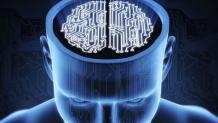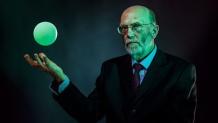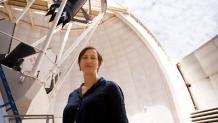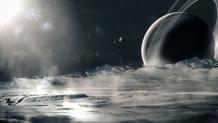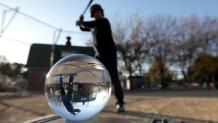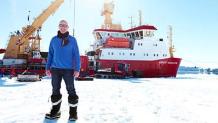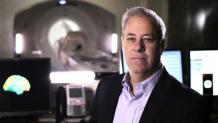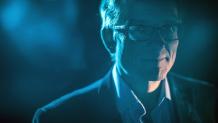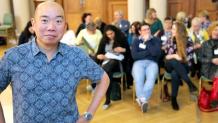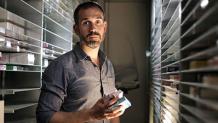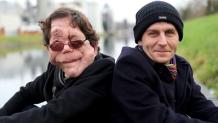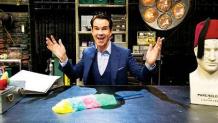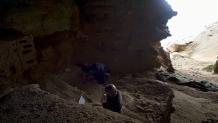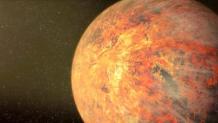
Horizon (1964)
Horizon tells amazing science stories, unravels mysteries and reveals worlds you've never seen before.
User rating:
2016x01 The Immortalist
16 March, 2016 9:00 pm
The gripping story of how one Russian internet millionaire is turning to cutting-edge science to try to unlock the secret of living forever.
Dmitry Itskov recently brought together some of the world's leading neuroscientists, robot builders and consciousness researchers to try to devise a system that would allow him to escape his biological destiny. Entering Dmitry's seemingly sci-fi world, Horizon investigates the real science inspiring his bold plan to upload the human mind to a computer.
There are doubters - like the major neuroscientist who tells us 'it's too stupid, it simply cannot be done'. But as we also meet the Japanese maker of Erica, one of the world's most human-like robots, who tells us the destiny of humans is to become robots to overcome the constraints of time, see how a quadriplegic Californian man is already controlling a robot arm with his thoughts, and explore the groundbreaking work of the scientist behind the world's largest neuroscience project - the $6 bi
2016x02 Project Greenglow: The Quest for Gravity Control
23 March, 2016 9:00 pm
This is the story of an extraordinary scientific adventure - the attempt to control gravity. For centuries, the precise workings of gravity have confounded the greatest scientific minds - from Newton to Faraday and Einstein - and the idea of controlling gravity has been seen as little more than a fanciful dream. Yet in the mid 1990s, UK defence manufacturer BAE Systems began a ground-breaking project code-named Greenglow, which set about turning science fiction into reality. On the other side of the Atlantic, Nasa was simultaneously running its own Breakthrough Propulsion Physics Project. It was concerned with potential space applications of new physics, including concepts like 'faster-than-light travel' and 'warp drives'.
Looking into the past and projecting into the future, Horizon explores science's long-standing obsession with the idea of gravity control. It looks at recent breakthroughs in the search for loopholes in conventional physics and examines how the groundwork carried
2016x03 The Mystery of Dark Energy
30 March, 2016 9:00 pm
Horizon looks at dark energy - the mysterious force that is unexpectedly causing the universe's expansion to speed up.
The effects of dark energy were discovered in 1998 but physicists still don't know what it is. Worse, its very existence calls into question Albert Einstein's general theory of relativity - the cornerstone of modern physics.
The hunt for the identity of dark energy is on. Experiments on earth and in space generate data that might provide a clue, but there are also hopes that another Einstein might emerge - someone who can write a new theory explaining the mystery of the dark energy.
2016x04 Oceans of the Solar System
06 April, 2016 9:00 pm
The oceans define the earth. They are crucial to life and we used to think that they were unique to our blue planet. But we were wrong.
It has recently been discovered that there are oceans all over our solar system and they are very similar to our own. And now scientists are going on an epic journey in search of new life in places that never seemed possible. Nasa is even planning to dive to the depths of a strange, distant ocean in a remarkable submarine.
Horizon discovers that the hunt for oceans in space is marking the dawn of a new era in the search for alien life.
2016x05 The End of the Solar System
13 April, 2016 9:00 pm
This is the story of how our solar system will be transformed by the aging sun before coming to a spectacular end in about eight billion years. Astronomers can peer into the far future to predict how it will happen by analysing distant galaxies, stars and even planets in their final moments.
In this film, Horizon brings these predictions to life in a peaceful midwestern town that has a giant scale model of the solar system spread out all over the city. As it ages, the sun will bloat into a red giant star, swallowing planets... as well as half the town. The fate of the Earth itself hangs in the balance. How will the solar system end?
2016x06 Should We Close Our Zoos?
17 April, 2016 9:00 pm
Liz Bonnin presents a controversial and provocative episode of Horizon, investigating how new scientific research is raising hard questions about zoos - the film explores how and why zoos keep animals, and whether they need to change to keep up with modern science or ultimately be consigned to history.
Should zoos cull their animals to manage populations? Liz travels to Copenhagen Zoo, who killed a giraffe and fed it to the lions, to witness their culling process first hand. They think it is a natural part of zoo keeping that is often swept under the carpet. Should some animals never be kept in captivity? In a world exclusive, Liz visits SeaWorld in Florida and asks if captivity drove one of their orcas to kill his trainer.
But could zoos be the answer to conserving endangered species? Liz examines their record, from helping breed pandas for the wild to efforts to save the rhinos. She meets one of the last surviving northern white rhinos and discovers the future of this species n
2016x07 How to Find Love Online
25 April, 2016 9:00 pm
Dr Xand Van Tulleken is single and looking for love. Mathematician Dr Hannah Fry wants to use him as her guinea pig to test whether the algorithms that dating sites use to match people actually work.
While Hannah builds a dating site, Xand meets the scientists investigating online dating - and learns what pictures to use and what to write in his profile. He tries out a 'bot' that has automated a swiping app and has an MRI scan to find out whether his brain is equipped for love.
50 members of the public take part in some mini experiments at a date night - and Xand goes on various dates to test whether the algorithm is better than him choosing randomly.
2016x08 Ice Station Antarctica
04 May, 2016 9:00 pm
Antarctica is the last great wilderness. It's the coldest, windiest, driest and most isolated place on Earth. And every winter, for over three months of the year, the sun never rises. But it's also home to the British Antarctic Survey's Halley Research Station.
A veteran of living and working at Halley in the early eighties, BBC weatherman Peter Gibbs makes an emotional return to the place he once called home. A place that, during his time, was key to the discovery of the ozone hole.
The journey starts with an arduous 12-day, 3000-mile voyage onboard the RRS Ernest Shackleton. Once on the ice shelf, Peter is delighted to finally arrive at the futuristic research station and marvels at the cutting edge science being done at Halley today. From vital discoveries about how our lives are vulnerable to the sun's activities, to studying interplanetary travel and the threat of man-made climate change.
But Peter's journey is also something of a rescue mission. The research station's ho
2016x09 Curing Alzheimer's
11 May, 2016 9:00 pm
Horizon investigates a new era of Alzheimer's research, which is bringing hope to millions of sufferers across the world. New scanning and gene technology is allowing scientists to identify the disease at its earliest stages, often 15 years before symptoms appear and the brain cells are destroyed. A series of new drugs trials in Colombia, the USA and Europe are showing startling success in reducing beta amyloid, the protein which is a hallmark of the disease.
It is also becoming clear that changes in lifestyle can prevent the development of the disease. A new system inside the brain has been discovered which clears amyloid when we are in deep sleep, but allows it to accumulate if we don't sleep well.
The programme reveals that for sufferers in the early stages of the disease, brain connections, or synapses, can be strengthened and even replaced by absorbing enough of the right nutrients. A UK-wide trail helps sufferers in the early stages to concentrate on improving everyday task
2016x10 E-Cigarettes: Miracle or Menace?
22 May, 2016 9:00 pm
Michael Mosley investigates the dramatic rise in e-cigarettes. They're everywhere these days, but what does the latest scientific research on them reveal? Michael reveals what e-cigarettes are really doing to your health. Are they really better for you than cigarettes? What is actually in them? Is passive vapour harmful? And can they really stop you from smoking? Michael meets some of the scientists around the world studying them, asks a group of volunteers to try to give up smoking regular cigarettes using them, and even takes up 'vaping' himself, smoking an e-cigarette every day for a month to see the effects on his own health - no easy task for such a committed non-smoker.
2016x11 Why Are We Getting So Fat?
07 June, 2016 9:00 pm
Over 62% of adults in the UK are currently overweight or obese and this figure is set to rise. A common attitude is that obese people should be ashamed - it is their fault, they have no will power and if they could just 'eat less and exercise more', the problem would soon be solved. Yet, despite millions of pounds being spent on this simple message, the UK is getting fatter every year.
Cambridge geneticist Dr Giles Yeo believes that for many obese people, simply eating less is a lot harder than you might think - and he is taking a road trip around the UK and America to uncover why. He meets the real people behind some of the more shocking newspaper headlines and, through their stories, reveals surprising truths which dispel commonly held myths about obesity. He gains access to scientists and doctors trialling cutting-edge techniques to tackle the crisis - from a 'miracle' hormone injection to a transfusion of faecal matter, and even learns a thing or two about his own size and relat
2016x12 Sports Doping - Winning At Any Cost?
19 July, 2016 9:00 pm
Dr Xand van Tulleken investigates the world of performance-enhancing drugs - from the athletes seeking the rewards of fame, glory and lucrative sponsorship deals to the hundreds of thousands of people in the UK now regularly taking anabolic steroids to look good and buff up. What are these drugs? What do they do to the body? And is it worth it?
Xand's investigation reveals the extraordinary gamble dopers take with their health. Long-term effects include kidney failure, cognitive impairment and testicular shrinkage, and Xand witnesses how users are self-experimenting with drugs that have not yet been approved for human use.
Horizon uncovers the new frontier of doping, from new molecules to gene therapy - where the genes that control muscle growth are altered. These new methods could be completely undetectable by the doping authorities. Finally, with the help of his twin brother Chris, Xand discovers the legal ways some athletes try to gain the edge.
2016x13 Inside CERN
10 August, 2016 9:00 pm
With exclusive behind-the-scenes access, Horizon follows the highs and lows of an extraordinary story in particle physics. In June 2015, teams at CERN started running the large hadron collider at the highest energy ever. Rumours quickly emerged that they were on the brink of a huge discovery. A mysterious bump in some data suggested a first glimpse of a brand new particle that could change our understanding of how the universe works.
A new particle could hint at extra dimensions and help us understand the very beginning of the universe - but first the team has to find it. Horizon follows the scientists as they hunt for the elusive signals that would prove if there is a new particle or if it is just noise from their machine.
2016x14 My Amazing Twin
25 August, 2016 9:00 pm
The acerbically witty and severely facially disfigured broadcaster Adam Pearson presents a personal film about genetics. He and his twin brother Neil are genetically identical and both share the same genetic disease, Neurofibromatosis 1 (Nf1) - yet they are completely different. Adam's face is covered with growths, whereas Neil has none. Neil has short-term memory loss, whereas Adam is razor sharp.
How can the same genetic disease affect identical twins so differently?
Adam is on the cusp of a successful film and television career, but the disease has left tumours on his face that are growing out of control and he could lose his sight. For years, everyone thought Adam's brother Neil had escaped symptoms, but today his life is governed by epilepsy and a mysterious memory loss that suddenly came on during his teens.
Determined to save their future, Adam tries to find out why the disease affects the twins so differently and see if there is anything he can do to stop it from teari
2016x15 Jimmy Carr and the Science of Laughter
11 September, 2016 9:00 pm
Jimmy and his guests try to get to the bottom of what laughter is, why we enjoy it so much and what, if anything, it has to do with comedy. Between them, and with the help of contributions from other scientists, they discover that laughter is much older than our species, and may well have contributed to making us human. With professors Sophie Scott, Robin Dunbar and Peter McGraw.
2016x16 The Lost Tribes of Humanity
12 October, 2016 9:00 pm
Alice Roberts explores recent discoveries in the study of human origins, revealing the transformation that has been brought about in this field by genetics.
Traditional paleo-anthropology, based on fossils, is being transformed by advanced genome sequencing techniques. We now know that there were at least four other distinct species of human on the planet at the same time as us - some of them identified from astonishingly well-preserved DNA extracted from 50,000-year-old bones, others hinted at by archaic sections of DNA hidden in our modern genome. What's more, we now know that our ancestors met and interacted with these other humans, in ways that still have ramifications today. Alice uses these revelations to update our picture of the human family tree.
2016x17 The Wildest Weather in the Universe
23 October, 2016 9:00 pm
We love talking about the weather - is it too hot or too cold, too wet or too windy? It's a national obsession. Now scientists have started looking to the heavens and wondering what the weather might be like on other planets. Today, we are witnessing the birth of extra-terrestrial meteorology, as technology is allowing astronomers to study other planets like never before. They began with our solar system, sending spacecraft to explore its furthest reaches, and now the latest telescopes are enabling astronomers to study planets beyond our solar system.
Our exploration of the universe is revealing alien worlds with weather stranger than anyone could ever have imagined - we've discovered gigantic storm systems that can encircle entire planets, supersonic winds, extreme temperatures and bizarre forms of rain. On some planets, the temperatures are so hot that the clouds and rain are believed to be made of liquid lava droplets, and on other planets it is thought to rain precious stones li
Video Gallery
Coming Soon...
Photo Gallery
Coming Soon...

